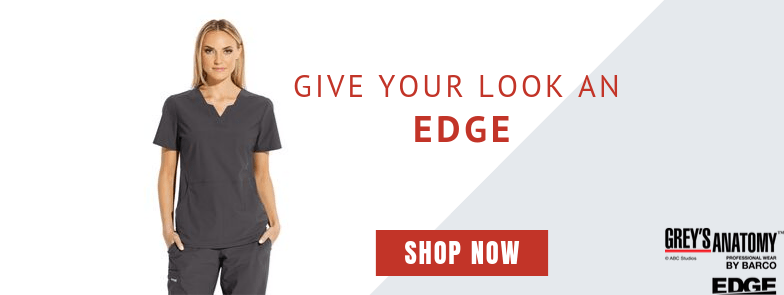New Nurse Checklist: 10 Must-Have Supplies
You work for years to become a nurse, and now you’ve made it! Here is your new nurse checklist with 10 must-have items to carry each day.
Nursing is a job that involves both a lot of hard physical work, high attentiveness, and lots of notetaking. It can be a very stressful job. Any new nurse should prepare themselves by coming to work fully equipped to handle the different facets of the job much more comfortably.
While nurses with different specialties will need different tools, these ten choices represent a general starter’s kit for any new nurse looking to be properly prepared for the challenges that lie ahead.
1. The Right Pair of Shoes
Shoes are more important than you might think to a nurse, for a simple reason – nurses are very often on their feet, and that can get quite painful in the wrong pair of shoes. While it doesn’t take a genius to know you should avoid high heels, a little padding on the underside of a shoe can be quite helpful.
It’s true that we humans generally didn’t wear padded footwear, but we also didn’t spend our days walking on tiles that have no give – to survive long shifts on hard, cold hospital floors, our feet need protection and comfort.
Look for clogs, tennis shoes, running shoes, or orthopedic shoes with an insole arch, a wide and roomy toe box, and a no-slip sole. Consult with your employer to make sure you won’t be violating any dress codes. The more washable the shoe, the better.
There may be moments when you’ll find yourself immersed in some blood or urine, and getting that out of a meshed shoe, running shoe, or leather clog is typically far more difficult than when cleaning out a rubber clog. Wear scrub booties over your shoes when performing tasks that involve bodily fluids.
2. Compression Socks
Compression socks or stockings help:
- Combat and prevent swollen or inflamed ankles
- Reduce the pressure of long hours spent standing and walking
- Lower the risk of varicose veins
They’re invaluable in addition to a comfortable pair of shoes, and not too pricey.
3. Comfortable Scrubs
While some employers will supply you with scrubs, more and more hospitals don’t. Check in with your higher ups to see what they do and don’t allow, and then look for a few comfortable scrubs for both men and women.
Cloth choice is key. A cotton blend is perfect for repeated laundering, but you’ll want something that’s still mostly cotton. Pure 100% cotton clothes are far more likely to shrink, even if they’re initially more comfortable.
When it comes to aesthetics, there are countless scrub choices – prints and colors of all kinds, v-necks and other cuts, and as many pockets as you’ll need. And you will need pockets.
4. Cheat Sheet/Notebook
Nursing school involves a lot of memorization and learning about all sorts of:
- Counterindications
- Algorithms
- Protocols
However, the reality is that you’ll want to rely on a little more than just memory. Cheat sheets are often essential for nurses, to help you recall the correct way to apply a treatment algorithm in a high-pressure, high-stress situation.
Similarly, there’ll be a lot you’ll want to note down and learn in your first few months as a nurse, and there will still be reasons to write down notes for many years after. A pocket notebook is always useful and can unobtrusively fit into your scrub pockets.
5. Click Pens and Clipboards
Non-smear click pens are best for a nurse, because it’s easy to keep them attached to your clothing and you don’t have to worry about ink leaks, detached caps, or dried out ink. A quality click pen that doesn’t smear is invaluable, as is a clipboard.
As a nurse, you’ll be receiving daily report sheets and there will be some paperwork to fill out. The last thing you want to worry about is running around with a stack of rolled or folded papers or leaving them somewhere you might not find them again. Keep them attached to your clipboard.
6. Comfortable Watch
You’ll want to tell time, and for more than just convenience. Nurses need accurate and legible watches to keep tempo while:
- Operating a BVM
- Counting respirations
- Checking heartrate, and so on
It also helps to know exactly how much time you’re spending on each task – for a busy nurse, time management can literally be a lifesaver.
However, avoid wearing clunkers on your wrist. You’ll want something unobtrusive yet accurate and visible, as well as durable.
7. Nursing Scissors
More than just a regular pair of scissors, medical scissors are specially made for cutting through gauze, bandages, tape, medication packaging, and more.
When time is of the essence and you don’t have the luxury of tearing through packaging with your fingers, a pair of sturdy medical scissors can shave seconds off a critical life-saving procedure.
They’re also useful for tubing, knots, and just about anything that’s in the way of getting your patient the care they need.
8. Pen Light
More than just a gadget, pen lights can be critical in:
- Assessing pupils
- Checking dark rooms
- Illuminating wounds and more
A pen light should always be on-hand, because you never know when you just need a little light.
9. Stethoscope
Stethoscopes are obviously for far more than just looking very medical – they’re vital tools for assessing a patient’s condition and catching vital danger signs before they turn into something much worse. They come in many different forms, from all-purpose ones to more specialized ones, so choose wisely.
While most hospitals provide their nurses with stethoscopes, you also have the option of procuring your own – it helps to have top-quality when trying to save lives.
Just be sure to add a nametag to your stethoscope, to ensure it doesn’t accidentally get lost with no chance of recovery.
10. Hand Sanitizer & Moisturizer
While there is no enforceable or recommended national nurse-to-patient ratio, it’s fair to say that nurses generally have their fair share of patients to deal with on any given shift.
Because physical contact has been established as the primary means through which patients accrue healthcare associated diseases at the hospital, it’s vital to regularly sanitize your hands as a new nurse.
However, it’s important to note that our hands are not used to being scrubbed clean or sanitized that many times a day. While it’s undoubtably important to stay sanitary for both yourself and your patients, it’s just as important to take care of your skin health and keep your skin healthy to avoid excessive peeling and cracking.
A hand cream/moisturizer can help replenish your skin and keep it from becoming damaged. Shea butter is a good choice, as are other options that don’t leave your hands feeling excessively oily.
The Bottom Line
Every new nurse should be well-equipped before venturing out to work on their first day – and every subsequent day.
While this list won’t include specifics that you might need for particularly detailed tasks, it’s likely comprehensive enough to help you do a better job, avoid much of the pain and discomfort that comes with an incredibly long shift, and better save lives in the process.



